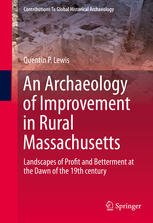

Most ebook files are in PDF format, so you can easily read them using various software such as Foxit Reader or directly on the Google Chrome browser.
Some ebook files are released by publishers in other formats such as .awz, .mobi, .epub, .fb2, etc. You may need to install specific software to read these formats on mobile/PC, such as Calibre.
Please read the tutorial at this link: https://ebookbell.com/faq
We offer FREE conversion to the popular formats you request; however, this may take some time. Therefore, right after payment, please email us, and we will try to provide the service as quickly as possible.
For some exceptional file formats or broken links (if any), please refrain from opening any disputes. Instead, email us first, and we will try to assist within a maximum of 6 hours.
EbookBell Team

4.1
20 reviewsThis book probes the materiality of Improvement in early 19th century rural Massachusetts. Improvement was a metaphor for human intervention in the dramatic changes taking place to the English speaking world in the 18th and 19th centuries as part of a transition to industrial capitalism. The meaning of Improvement vacillated between ideas of economic profit and human betterment, but in practice, Improvement relied on a broad assemblage of material things and spaces for coherence and enaction.
Utilizing archaeological data from the home of a wealthy farmer in rural Western Massachusetts, as well as an analysis of early Republican agricultural publications, this book shows how Improvement’s twin meanings of profit and betterment unfolded unevenly across early 19th century New England. The Improvement movement in Massachusetts emerged at a time of great social instability, and served to ameliorate growing tensions between urban and rural socioeconomic life through a rationalization of space. Alongside this rationalization, Improvement also served to reshape rural landscapes in keeping with the social and economic processes of a modernizing global capitalism. But the contradictions inherent in such processes spurred and buttressed wealth inequality, ecological distress, and social dislocation.